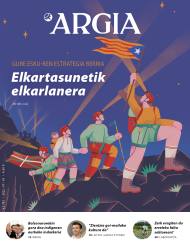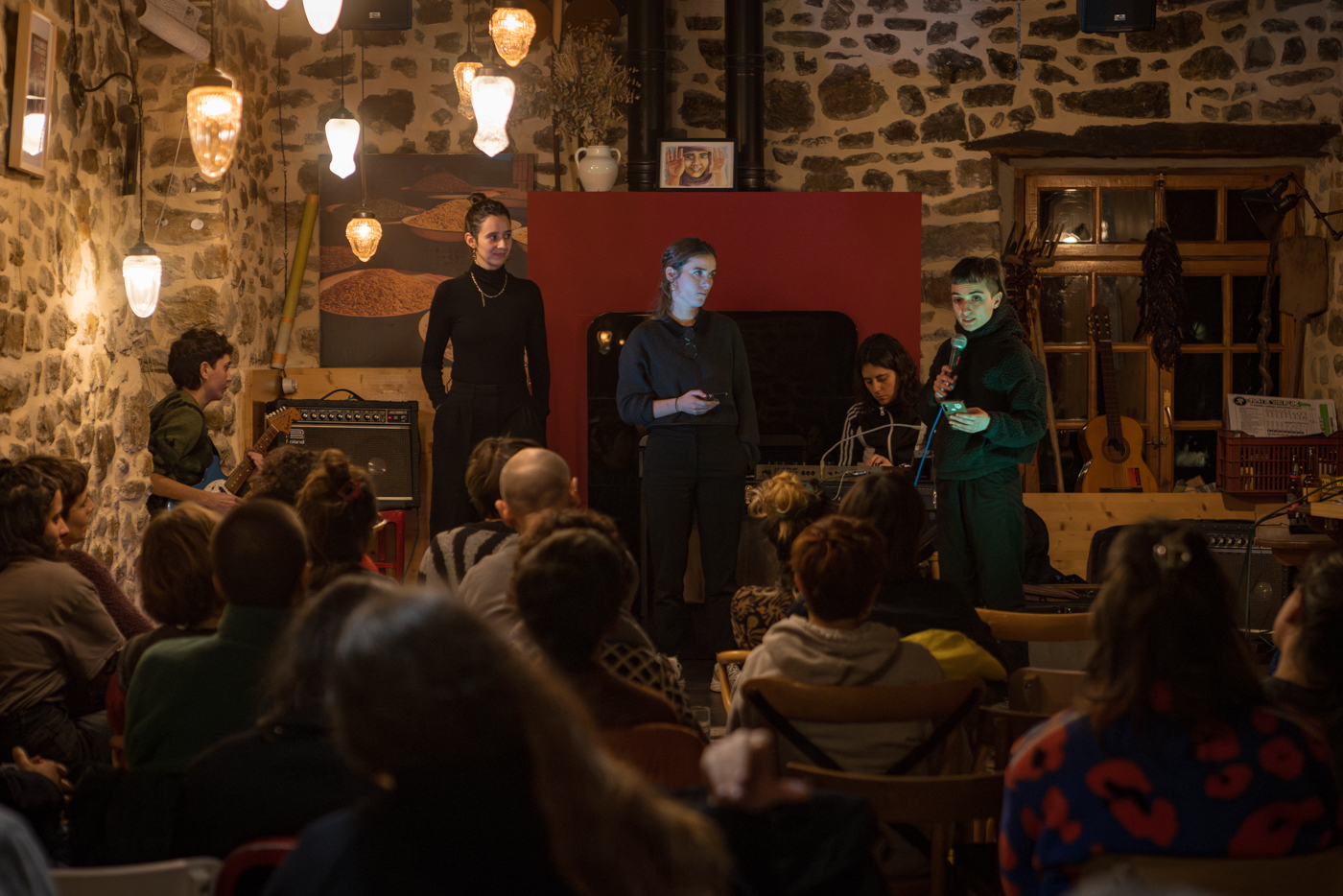Basque literature in feminism and collective
- Several feminist agents of the Basque literary system – editors, writers, professors, readers, cultural critics, etc. – have dialogued for two years, leading the processes to convene Feminist Literary Encounters. On 1 and 2 July they will be held at the Women's House of Vitoria-Gasteiz. To learn more about the meetings we spoke with Amaia Alvarez Uria, Sareinak's colleague.

“In the Basque literature there has been progress from a feminist point of view in recent years, this is evident. We have great writers, we have an editorial feminist presence, we have groups of feminist readers in all countries.” Amaia Alvarez Uria wanted to value this base, although there is still much to do. For fifteen years, Alvarez has been part of the Sareinak group, which is dedicated to weaving the Basque literary network with the needle of feminist theory, and taking into account the advances mentioned, it seems that they have given the punctuations correctly. “Our network, our literature, we perceive it perforated and, in most cases, the names, books and works of women dress up from those holes,” they said in 2007, coinciding with its creation. Although needles are still strictly necessary today, progress is evident and one of the most significant indicators of this positive evolution are the Feminist Literary Encounters.
The Network is organizing the meetings to be held on 1 and 2 July at the Women's House in Vitoria-Gasteiz. Without realizing it, it has led to a journey that started fifteen years ago, as Alvarez explained. With the aim of “making visible, valuing, disseminating and sharing” the work carried out by women in the Basque literature and of bringing together through the literature some peripheral issues, once a year began to organize a talk or colloquium in different places in the Basque Country, in each of the two or three writers. This format began to interspersed with tributes in 2017, as upon the death of Marijane Minaberri it was prioritized to do something in her honor; the act of memory was celebrated in Aldude, near the Banca that was born, in collaboration with the Basque group Adur. In 2019, after the death of Mayi Pelot, they returned to repeat the homage format, paying tribute to the newly deceased in the gaztetxe Zizpa of Baiona. By 2020 they had to return to the format of round tables, as feminist publishers and bookstores were thinking of meeting in Katakrak in Pamplona, but the pandemic frustrated their intentions. However, in this context the seed that was to be registered in the Feminist Literary Encounters emerged. “We did not hold the round table, but in the Basque literary system there were new feminist actors, and there was a need to bring them together and share them. So some online meetings emerged.” These meetings gave way to conversations that have lasted for two years, and hence the desire to hold face-to-face meetings, as “the need to bring together and talk to feminists in Basque literature was revealed.” Editors, writers, teachers, readers, cultural critics… many feminist agents of the Basque literary system have participated in this process that has lasted a couple of years.
In the Basque literary system, new feminist agents had to be integrated, grouped and shared, and thus some online meetings emerged in the context of the pandemic. These meetings gave way to interviews that have lasted for two years, and hence the desire to hold face-to-face meetings.
The two days of the meetings have been structured in a similar way: the mornings will be offered to the round tables and the evenings to the workshops with coffee breaks and food. The introductory act will begin the meetings and introductory conferences of literary criticism and professor Iratxe Retolaza, co-founder of Sareinak. Then, after the room, there will be a round table that will bring together editorials and bookstores, in which Leire López Ziluaga de Susa, Nerea Fillat de Katakrak and María Mur de Consonni will sit. This round table, as pointed out by Sareinak member Gema Lasarte, to Hala Bedi, shows a phenomenon that has occurred in the Basque literature in recent years: the increase in the presence of female editors. “We have not had publishers until recently. And where is it decided what will be published, what will or will not be universal literature, what is good and bad literature? That is often decided by men.” The table workshops shall continue on the first day programme and participants shall choose from three to be held simultaneously: Criticism (from the hand of Andrea Vides and Gema Lasarte), Teaching (directed by Katixa Dolfi Zaldunbide and Amaia Alvarez Uria) and Media (with Oihana Arana and Leire Vargas). _page-0001.jpg)
The second day will begin with a round table on genealogies. Karmele Jaio, Laura Mintegi and Itziar Ugarte will engage in dialogue to foster intergenerational dialogue. Subsequently, it will be the turn of a round table of feminist lecturers in which Ainhoa Aldazabal, Iratxe Retolaza and Ines Castiella will participate. As in the first day round table, this also shows another significant phenomenon in Basque literature in recent years, according to Lasarte: the strengthening of feminist readers groups. After lunch, Illustration and Theater workshops will be held (with the help of Maite Caballero and Paula Estévez, and Amancay Gaztañaga, respectively), with the aim of bringing literature from another place. And to close the day and the meetings, they will pay tribute to Itxaro Borda, Mariasun Landa and Arantxa Urretabizkaia. “They began the presence of female writers in the Basque literature. There is more – Laura Mintegi, Aurelia Arkotxa, Nerea Azurmendi, Amaia Lasa…–, but we have chosen those three that are still writing strong,” explains Lasarte.
The fundamental objective of the meetings is to encourage the feminists orbiting Basque literature to meet and get to know to set objectives that once achieved go beyond. For example, to make a diagnosis of the Basque literature and “begin to impress from this diagnosis the objectives of the future, the strategy, the roadmap”. These would be the main objectives of the meetings, according to Alvarez. “We will have to see what challenges we have, what we want to achieve, in what direction we want to go.” He is optimistic that the diversity of roles of the participants in the meetings - editors, readers, writers - allows to make a rich diagnosis, a diversity that allows observing the past, the present and the future from different areas, achieving a polyhedral perspective of Basque literature.
Make a diagnosis of the Basque literature and “begin to impress from this diagnosis the objectives of the future, the strategy, the roadmap”. These would be the main objectives of the meetings, according to Alvarez.
The meetings will be decisive for drawing the feminist direction of Basque literature. We will have to see what the path is to be taken, but for its part, Álvarez has shared several paths that he would take. On the one hand, it refers to those that it has called “those of always”: “Visibility, valuation, denunciation of prejudice and beliefs, inclusion among feminists, promotion of cooperation…”. But he also mentions what he has explained in more depth: to value and promote the collective sense of literature. “Literature speaks a lot of loneliness. It is said that the writer works alone, even the editor, and that only the reader reads. No reference is made to the group. But the writer is not alone, he always has readers, or when a person is blocked in the creative process to speak, and his work drinks what he sees and what he has learned. And the same with the readers; although he reads the book alone, he then comments on it in the group of readers, in the group of friends, in the family, with the partner, with the lover… Therefore, from a feminist perspective, claiming that group work can be a path we can take.” In Álvarez's eyes, the nicest part of reading a book is its experience as a reader, and the way to enrich it is to share it. In this sense, since it is about sharing experiences with a dimension of the Basque Country, Feminist Literary Encounters have the potential to enrich.
Astelehen honetan hasita, astebetez, Jon Miranderen obra izango dute aztergai: besteren artean, Mirande nor zen argitzeaz eta errepasatzeaz gain, bere figurarekin zer egin hausnartuko dute, polemikoak baitira bere hainbat adierazpen eta testu.
Martxoaren 17an hasi eta hila bukatu bitartean, Literatura Plazara jaialdia egingo da Oiartzunen. Hirugarren urtez antolatu du egitasmoa 1545 argitaletxeak, bigarrenez bi asteko formatuan. "Literaturak plaza hartzea nahi dugu, partekatzen dugun zaletasuna ageri-agerian... [+]
1984an ‘Bizitza Nola Badoan’ lehen poema liburua (Maiatz) argitaratu zuenetik hainbat poema-liburu, narrazio eta eleberri argitaratu ditu Itxaro Borda idazleak. 2024an argitaratu zuen azken lana, ‘Itzalen tektonika’ (SUSA), eta egunero zutabea idazten du... [+]
Joan Tartas (Sohüta, 1610 - date of unknown death) is not one of the most famous writers in the history of our letters and yet we discover good things in this “mendre piece” whose title, let us admit it from the beginning, is probably not the most commercial of the titles... [+]




















ilbeltza-(1).jpg)

